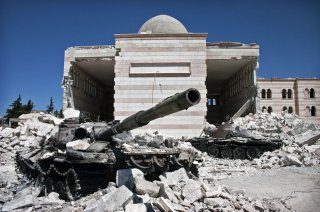Shameless: The UN Fiddles While Syria Burns
The UN Security Council should be ashamed of itself...
“Unless the Council delivers on its call for accountability, including an arms embargo, it risks losing credibility.”
That remark from Philippe Bilopion, the United Nations Director at the global rights watchdog Human Rights Watch, rings loud and clear to the countless civil servants, analysts, and policymakers who have been focusing on the horror that is the Syrian civil war over the past four years. It’s a simple statement, but one that describes perfectly how irrelevant and ineffectual the United Nations Security Council has been on the issue of Syria. Put simply — and in the bluntest terms possible — the Security Council has been an absolute embarrassment, an elite multilateral body that time and again has been unable to pass the most basic of resolutions on the conflict.
The war in Syria has seen countless cases of human rights abuses, war crimes, and crimes against humanity against detainees, innocent civilians, and political activists perpetrated by the Bashar al-Assad regime. The list is as graphic as it is long: summary executions of opposition sympathizers; the systematic and mass-scale torture of prisoners in Syrian detention facilities; the wanton killing of women and children; and the casual dropping of large-barrels on neighborhoods packed with civilians and refugees. Whole neighborhoods and city blocks have been destroyed by these crude barrel bomb attacks and entire families have been wiped out from the kinds of weapons that have left mothers paraplegics and children blinded, as captured in this descriptive piece from an orthopedic surgeon who dedicated his time to helping the injured.
Yet, however deadly these munitions are, it’s been the use of chemical substances that have horrified the international community the most. The August 21, 2013 sarin gas attack on rebel-held districts outside Damascus, an attack that claimed the lives of over 1,400 people, was so shocking and against any civilized person’s conscience that it spurred Russia — Bashar al-Assad’s biggest supporter on the Security Council — to cosponsor a resolution demanding the regime’s full dismantlement of its chemical weapons production facilities. It was the one instance in the Syrian conflict when the Syrian government was held accountable, and it was the only case in the past four years where all five members of the Security Council were able to come together and enforce a resolution and ensure compliance.
Since then, however, the Security Council has reverted back to old-self. As least with respect to Syria, the Council is a paper tiger: expressing outrage at the violence, but doing nothing to stop it. And, when resolutions are passed in unanimity, the Council has been unable to enforce what they’ve passed.
Two specific cases stand out. On February 22, 2014, the Council passed Resolution 2139, which demanded “that all parties immediately cease all attacks against civilians, as well as the indiscriminate employment of weapons in populated areas.” The Syrian government was specifically mentioned, which was a welcome exception of calling out the Assad regime’s behavior.
The Council acted with a similar degree of urgency on March 6, 2015, when it expressed concerns that chlorine munitions were being used as weapons of war — weapons that only the Syrian authorities have at their disposal in large numbers.
If the Syrian government complied, we could sit here and laud the international community for being proactive in the face of the worst humanitarian catastrophe in the 21st Century. Instead, in typical Assad fashion, both of these resolutions have been blatantly violated, barrel bombs continue to slam into schools, hospitals, and homes, and chlorine gas continues to be dropped from helicopters. Six separate chlorine attacks were perpetrated over a two-week time frame only ten days after the March 6 resolution passed through the chamber. The videos of the choking victims generate tears and heartbreak in the Security Council chamber, but nothing else.
The war goes on, hundreds of civilians continue to die, families continue to be torn apart, and the Security Council — held hostage by Russia and China — remain deadlocked on what to do.
Even the most strident multilateralist and advocate of the United Nations cannot deny the simple fact that the Security Council — the highest collective decision-making body in the world on maintaining international peace and security — has essentially been defeated by Bashar al-Assad. As long as Russia and China keep acting as holdouts, Assad will keep killing his own people in perpetuity.
Daniel R. DePetris is a Middle East analyst for Wikistrat, Inc., a geopolitical risk consulting firm, and a consultant to a Washington think-tank. He can be followed @DanDePetris.
Image: Wikimedia/Christiaan Triebert

